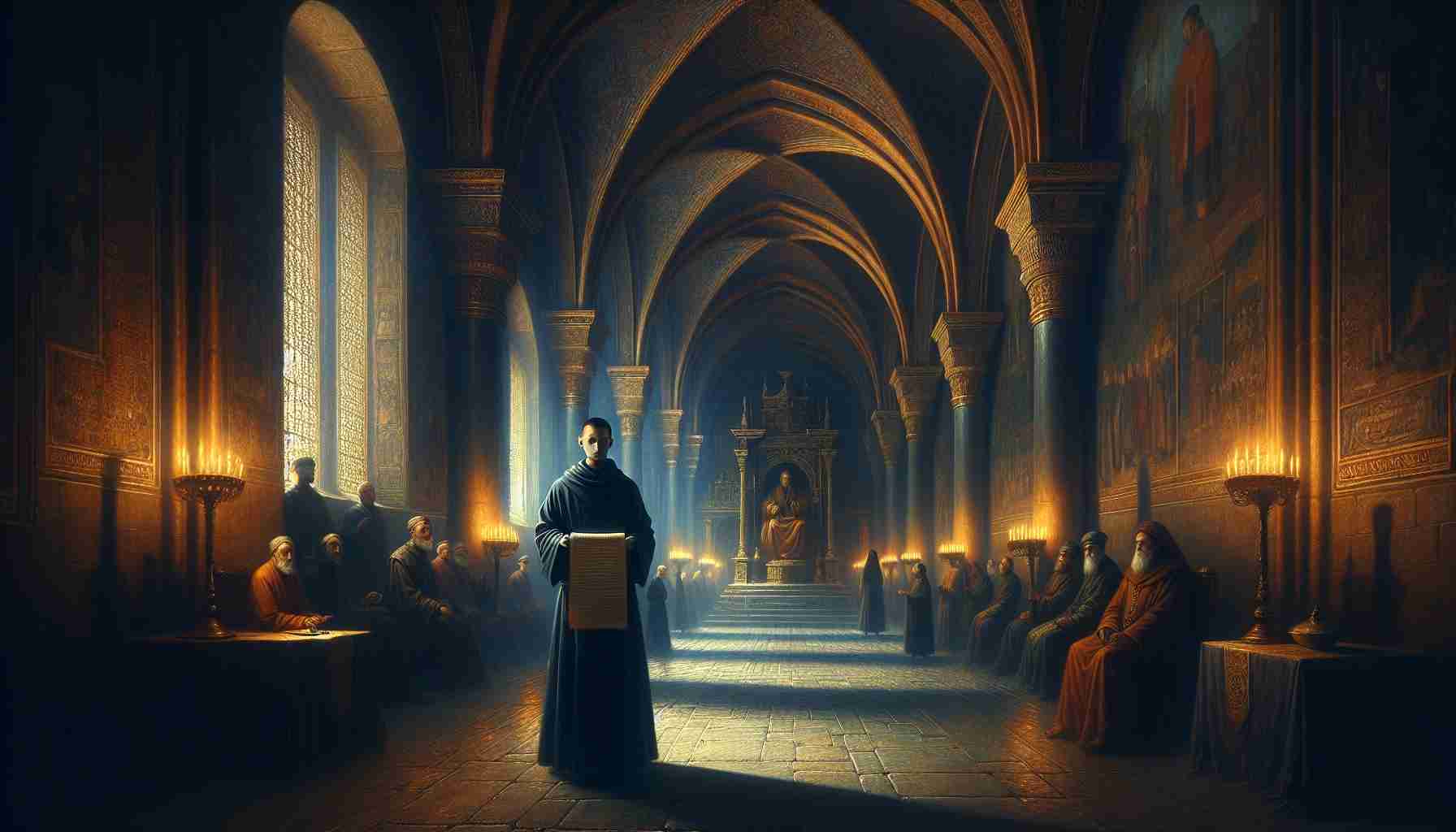

The air within the city of Worms clung like a heavy curtain, dampened by the Rhine’s breath and thick with unease. Soldiers in imperial livery lined the narrow streets, their halberds standing like stakes of warning. Over them loomed the shadowy bulk of the Bishop’s Palace, its Romanesque arches worn by the grind of centuries, its halls now echoing with voices that could alter the world.
Inside, torches sputtered along the stone walls. Cloaks swished over polished floors. Nobles, bishops, and envoys murmured behind bejeweled hands and beneath feathered hats. The great hall where emperors had once knelt before popes now held a different sort of reckoning—a solitary monk stood at its heart.
Martin Luther’s robe, of simple black wool, bore no trace of gold thread or embroidered seal. Yet even without the markers of office, his presence cleaved the room. Before him sat Emperor Charles V, only twenty-one, stiff on his throne beneath the double-headed eagle of the Holy Roman Empire. Behind the boy-emperor, cardinals inclined their heads as though measuring how deep a monk could be buried in the earth.
The moment was for silence. Luther lifted his gaze, dark eyes steady.
“You have been summoned,” said the archbishop at his left, his voice sharpened with ecclesial gravity, “to answer for your writings. Will you recant them—all of them?”
Two days earlier, Luther had asked for time. Tonight, there would be no more delay. In the hush, the monk reached for parchment laid before him—fifteen texts condemned by Rome. He could not deny all at once; some were pure exposition of Scripture, others challenges to the corruption festering in the Church’s breast—indulgences traded like coin, relics carved from fraud, and salvation sold to the desperate.
His words came not in defiance, but with the solemn cadence of a confession.
“Unless I am convinced by Scripture and plain reason…” His voice carried through the vaults of the hall, neither boastful nor afraid. “My conscience is captive to the Word of God. I cannot and I will not recant.”
A breath rose among the crowd—some incredulous, others struck dumb. Charles stood, his young face flushed with royal indignation. “A single monk, against the heritage of centuries?” he thundered. “Against the judgment of the Church, the world’s princes, and the apostolic faith?” He turned to his court. “This man is no more than a heretic.”
Thus began the Edict of Worms, sealed on May 26, 1521. Under it, Luther was declared an outlaw—his writings forbidden, his person fair prey to any loyal citizen. Towers bore the decree as if it were law carved in iron.
Yet parchment may rend, and ink may fade. Not so the Word carved into heart and mind. “Forever, O Lord,” Psalm 119 had long declared, “your word is firmly fixed in the heavens.” Words no empire could annul.
Two nights later, under a moon veiled by cloud, a small band of riders hastened along the wooded road from Worms. Hooves muffled in loam, cloaks drawn against recognition. At their center rode the outlawed monk—spirited away not by rebels, but by sympathizers cloaked in silence. Among them, Frederick the Wise’s men, who would hide him in the fortress of Wartburg.
The road twisted through misty thickets and ancient fields, across lands where the Holy Roman Emperor’s coins did not clink so loudly. As darkness cloaked them, Luther turned once on his saddle toward the city’s slumbering glow. Somewhere behind those lights was the throne of empire. But before him—beyond the hills, beyond the veils of language and lineage—was a higher realm, made of truth, not gold.
In the months that followed, hidden among deer-haunted forests and mossed ramparts, Luther inked the words of God into German. The Bible—long confined to Latin’s holy tomb—was now a voice for the cobbler, the butcher, the peasant girl by candlelight. He translated Scripture not as a rebel’s manifesto, but as a release of chains. For those who read it, freedom came not with swords, but with a Word eternal.
Even as the edict forbade his name, students copied his texts by hand and smuggled them in flour sacks. Wives hushed their children in barns to read contraband verses by firelight. Priests wept, not from guilt, but for the first time, from grace understood.
Years passed. Empires shifted. Princes chose sides. The printing press rolled its drums of ink, and Protestantism bloomed like almond trees in spring. The edict itself weathered in archives—ignored by time’s march, unenforced by emperors too preoccupied with wars and politics.
Luther, no longer a fugitive, walked freely again through Wittenberg. Yet the fire first kindled in that vaulted hall at Worms never went out. It flared in Scotland, in Geneva, and across oceans yet unreached.
Decrees may thunder and emperors may rule, yet the Word preserves itself.
And the monk—outlawed to silence—spoke still.